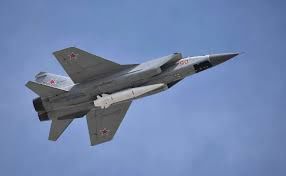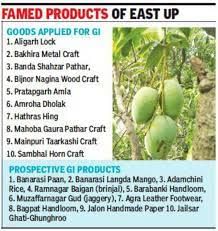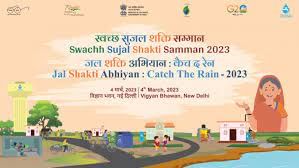UPSC Daily Current Affairs - 10th March 2023 | Current Affairs & Hindu Analysis: Daily, Weekly & Monthly PDF Download
GS-II
SWACHH SUJAL SHAKTI SAMMAN 2023 and National Water Mission (NWM)
Why in News?
Recently, the President Conferred the SWACHH SUJAL SHAKTI SAMMAN 2023
About SWACHH SUJAL SHAKTI SAMMAN 2023 :
- The “Swachh Sujal Shakti Samman 2023”, is organized by the Ministry of Jal Shakti.
- Objective: to honor the women champions of the rural water and sanitation sector.
- This event organized in the run-up to International Women’s Day was to felicitate the exceptional and exemplary work being done at the grassroots level by women in the implementation of Swachh Bharat Mission – Grameen (SBM-G), Jal Jeevan Mission (JJM), Jal Shakti Abhiyan: Catch the Rain (JSA-CTR).
- Ministry of Jal Shakti Celebrates International Women’s Day, 2023
- President of India Smt. Droupadi Murmu felicitated the ‘Swachh Sujal Shakti Samman’ Awardees.
- Union Minister of Jal Shakti presented the first copy of ‘Swachh Sujal Shakti Ki Abhivyakti’ to President
- President also presented with National Water Missions customized ‘My Stamp’ by Minister of State for Communications.
About National Water Mission (NWM) :
- The National Water Mission is one of the eight missions in the National Action Plan on Climate Change launched by the Prime Minister to tackle the threats of global warming.
- The objective of the National Water Mission is “conservation of water, minimizing wastage and ensuring its equitable distribution both across and within States through integrated water resources development and management”.
5 major Goals of the National Water Mission:
- Comprehensive water data base in the public domain.
- Assessment of the impact of climate change on water resources;
- Promotion of citizen and state actions for water conservation, augmentation, and preservation;
- Focused attention to vulnerable areas including over-exploited areas;
- Increasing water use efficiency by 20%; and
- Promotion of basin-level integrated water resources management
Source: PIB
International Criminal Court (ICC)

Why in News?
The New Yoke Times recently reported that the Pentagon — United States Ministry Of Defence — is blocking any evidence-sharing with the International Criminal Court (ICC) to punish Russia for the alleged atrocities in Ukraine.
About International Criminal Court (ICC):
- It is the only permanent international criminal tribunal.
- Background: It was created by the 1998 Rome Statute of the International Criminal Court (its founding and governing document), and began functioning on 1 July 2002 when the Statute came into force.
- Mandate: It investigates and, where warranted, tries individuals charged with the gravest crimes of concern to the international community: genocide, war crimes, crimes against humanity, and the crime of aggression.
- HQ: Hague, Netherlands.
- Members: 123 nations are States Parties to the Rome Statute and recognize the ICC’s authority; the notable exceptions being the US, China, Russia, and India.
- Funding: The Court is funded by contributions from the States Parties and by voluntary contributions from Governments, international organizations, individuals, corporations, and other entities.
- Composition:
- Judges: The court has eighteen judges, each from a different member country, elected to nonrenewable nine-year terms.
- The Presidency: Consists of three judges (the President and two Vice-Presidents) elected from among the judges. It represents the Court to the outside world and helps with the organization of the work of the judges.
- Judicial Divisions: 18 judges in 3 divisions, the Pre-Trial Division, the Trial Division, and the Appeals Division.
- Office of the Prosecutor (OTP): OTP is responsible for receiving referrals and any substantiated information on crimes within the jurisdiction of the Court. OTP examines these referrals and information, conducts investigations, and conducts prosecutions before the Court.
- Registry: The core function of the Registry is to provide administrative and operational support to the Chambers and the Office of the Prosecutor.
- Jurisdiction of ICC:
- Unlike the International Court of Justice, which hears disputes between states, the ICC handles prosecutions of individuals.
- The ICC is only competent to hear a case if:
- the country where the offence was committed is a party to the Rome Statute; or
- the perpetrator's country of origin is a party to the Rome Statute
- The ICC may only exercise its jurisdiction if the national court is unable or unwilling to do so.
- The ICC only has jurisdiction over offences committed after the Statute’s entry into force on 1 July 2002.
- Relation with UN:
- While not a United Nations organization, the Court has a cooperation agreement with the United Nations.
- When a situation is not within the Court’s jurisdiction, the United Nations Security Council can refer the situation to the ICC, granting it jurisdiction.
Source: The Hindu
GS-III
Kinzhal Missile

Why in News?
Russia recently fired hypersonic Kinzhal missiles as part of a massive wave of strikes on Ukraine.
About Kinzhal Missile:
- The Kh-47M2, nicknamed "Kinzhal" (Dagger), is a nuclear-capable, Russian air-launched ballistic missile.
- It was one of six “next generation” weapons unveiled by Russian President Putin during a speech in March 2018.
- Features:
- The Kinzhal can reach speeds of up to Mach 10 (12,350 km/hr).
- It can carry both conventional and nuclear warheads with a payload of up to 480 kg and a thermonuclear option with a 10-50 kt warhead.
- It has a reported range of 1,500-2,000 km.
- The Kinzhal has a length of 8 m, a body diameter of 1 m, and a launch weight of approximately 4,300 kg.
- It is designed to be launched from MiG-31 fighter jets at altitudes of about 18 km (59,000 ft).
- This missile maneuvers during all stages of its flight to overcome hostile air defense systems.
What are Hypersonic Missiles?
- A hypersonic missile is a weapon system which flies at least at the speed of Mach 5e. five times the speed of sound and is manoeuvrable.
- These missiles are extremely fast and far harder for surface-to-air missile defence systems to target.
Source: The Hindu
Erythritol

Why in News?
Recent studies show that the Artificial sweetener erythritol can increase heart attack risk.
About Erythritol :
- Erythritol is a sugar alcohol used as a low-calorie sweetener.
- Erythritol belongs to a class of compounds called sugar alcohols.
- Other sugar alcohols: xylitol, sorbitol, and maltitol.
- With only 6% of the calories of sugar, it still contains 70% the sweetness.
Natural Occurrence and Production
- Erythritol, just like sorbitol and xylitol, is a sugar alcohol that is naturally found in many fruits, vegetables, and fermented foods.
- It also occurs in human body fluids such as eye lens tissue, serum, plasma, fetal fluid, and urine.
- At the industrial level, it is produced from glucose by fermentation with a yeast, Moniliella pollinis.
Uses
- It is used in beverages such as coffee and tea, liquid dietary supplements, juice blends, soft drinks, and flavoured water product variations, with foods including confections, biscuits and cookies, tabletop sweeteners, and sugar-free chewing gum.
Advantages :
- It functions as low-calorie sweeteners in sugar-free or low-sugar products.
- It is found in small amounts in nature, especially in fruits and vegetables.
- It contains almost no calories.
- It does not raise blood sugar or insulin levels.
- Human studies show very few side effects.
Erythritol side effects:-
- About 90% of the erythritol is absorbed into your bloodstream.
- Due to their unique chemical structure, the body can’t digest them, and they pass unchanged through most of the digestive system until they reach the colon.
- In the colon, they’re fermented by the resident bacteria, which produce gas as a by-product.
- Consequently, eating large amounts of sugar alcohols may cause bloating and digestive upset.
Source: THE TIMES OF INDIA
Mango varieties with GI tag and states

Why in News?
Recent reports suggest that extended monsoon, warm winter may reduce Alphonso mango yield by 40%.
About Mango varieties with GI tag and states :
- Alphonso – (The Konkan region comprising Palghar, Thane, Raigad, Ratnagiri and Sindhudurg districts) Maharashtra
- Laxman Bhog – (Malda) West Bengal
- Khirsapati (Himsagar) – (Malda) West Bengal
- Fazli – (Malda) West Bengal
- Malihabadi Dusseheri – Lucknow (Malihabad, Mal, Kakori and Bakshi kaTalab along the banks of Gomti river) Uttar Pradesh
- Appimidi – (Shimoga, Uttara Kannada, Dakshina Kannada, Chikmagalur, Hassan and Udupi regions) Karnataka
- Gir Kesar – (Junagadh (Around Gir Forest) Gujarat
- Marathwada Kesar – (Marathwada Division (Aurangabad, Nanded, Parbhani, Latur, Beed, Hingoli, Jalna and Osmanabad) Maharashtra
- Banganapalle – (Banganapalli ,Kurnool) Andhra Pradesh
- Zardalu- (Bhagalpur and surroundings of Banka and Munger district) Bihar
- Rataul – (Baghpat) Uttar Pradesh
- Salem Mango – (Krishnagiri, Salem, Namakkal, Dharmapuri )Tamil Nadu
Source: DOWN TO EARTH
Madhav National Park

Why in News?
Three Tigers, as part of a tiger reintroduction project, will soon be released in Madhav National Park.
About Madhav National Park:
- Location:
- It is situated near Shivpuri town in Shivpuri District, which lies in the northwest region of Madhya Pradesh.
- It lies on the northern fringe of the Central Highlands of India, forming a part of the Upper Vindhyan Hills intermixed with plateaus and valley sections.
- It was named after Madho Rao Scindia, the Maharaja of Gwalior belonging to the Scindia dynasty of the Marathas.
- The Park was the hunting ground of Mughal emperors and Maharaja of Gwalior.
- It got the status of a National Park in 1958.
- The Sakhya and Madhav Sagar lakes are two of the most critical zones of the park and are always surrounded by animals and birds seeking relief from the heat.
- The Park is gifted with a diverse ecosystem comprising lakes, forests, and grasslands.
- Vegetation: The Park represents the Northern Tropical dry deciduous mixed forest as well as dry thorn forest.
- Flora: Some of the main tree species found inside the park include Khair (Acacia catechu), Salai, Kerdhai, Dhawda, Tendu, Palash, and others alike.
- Fauna:
- It is home to antelopes like Nilgai, Chinkara, Chowsinga, and Deer, including Chital, Sambar, and Barking Deer.
- Animals like the Leopard, Wolf, Jackal, Fox, Wild Dog, Wild Pig, Porcupine, Python etc., are also sighted in the park.
Source: Indian Express
National Consumers Cooperative Federation of India Limited (NCCF)
Why in News?
Recently, the Centre directed NAFED and the National Consumers Cooperative Federation of India Limited (NCCF) to immediately intervene in the market for the purchase of Red Onion (Kharif) in the wake of reports of their falling prices.
About National Consumers Cooperative Federation of India Limited (NCCF) :-
- NCCF is an apex organization for Consumer Cooperatives.
- It works under the Ministry of Consumer Affairs, Food and Public Distribution.
Objectives :-
- to promote the consumer cooperative movement in the country
- aspires to facilitate the voluntary formation and democratic functioning of cooperatives, based on self-reliance and mutual aid for overall economic betterment and financial autonomy.
- to provide supply support to the consumer cooperatives and other distributing agencies for the distribution of consumer goods at reasonable and affordable rates besides rendering technical guidance and assistance to the consumer cooperatives.
- It is the spokesman of the consumer cooperative movement in the country.
- It provides the following services for strengthening the movement in the country
- The National Co-operative Consumers’ Federation of India Ltd. (NCCF) has a Vigilance Cell headed by a Chief Vigilance Officer (CVO) on deputation from Govt. of India.
- The CVO assists the management of NCCF in maintaining the transparency and integrity in general administration
Membership:-
The membership of NCCF, is open to the following:
- Apex level Consumer Cooperative Federations in States.
- State level Cooperative organisations having distribution of Consumer goods as one of its objectives in such states as do not have exclusive apex federation of consumer cooperatives.
- Consumer Cooperative Societies and other Cooperative Societies doing retail distribution of consumer goods having turnover of Rs.50 Lakhs.
- Government of India
- National Cooperative Development Corporation (NCDC)
- NCUI without any obligation to pay either admission fee or share money
- NAFED or any other National Cooperative Organization
Source: PIB
|
38 videos|5288 docs|1117 tests
|
FAQs on UPSC Daily Current Affairs - 10th March 2023 - Current Affairs & Hindu Analysis: Daily, Weekly & Monthly
| 1. What is the significance of GS-II in the UPSC exam? |  |
| 2. What are the topics covered in GS-III for the UPSC exam? |  |
| 3. How can I prepare for GS-II effectively for the UPSC exam? |  |
| 4. What is the importance of current affairs in GS-II for the UPSC exam? |  |
| 5. Can I rely solely on the NCERT books for GS-III preparation in the UPSC exam? |  |























